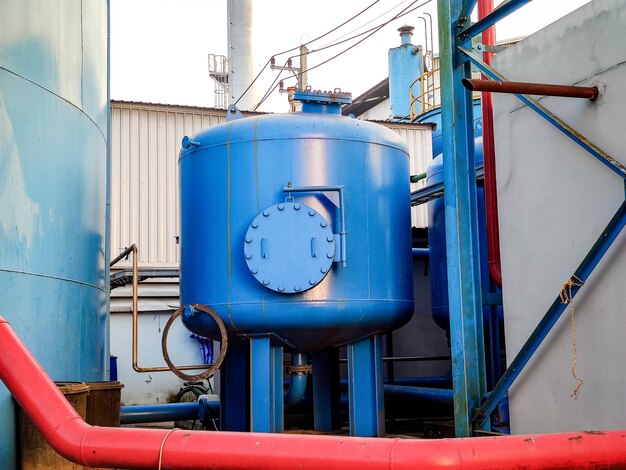
Managing wastewater is a critical challenge in industries that handle oil, grease, and hydrocarbons. In the UAE, industries such as marine, oil and gas, manufacturing, and power generation must comply with strict environmental regulations. An oily water separator (OWS) plays a crucial role in treating wastewater by removing oil contaminants before discharge. These systems ensure water quality, protect marine life, and help industries meet regulatory standards. Understanding how an oily water separator works, its benefits, and compliance requirements in the UAE is essential for industries dealing with wastewater treatment.
What Is an Oily Water Separator?
An oily water separator is a filtration system designed to separate oil, grease, and other hydrocarbons from water. These systems are commonly used in ships, refineries, power plants, and industrial facilities where oil-contaminated water is produced. The separator functions by using gravity, coalescing materials, and filtration techniques to remove oil and ensure cleaner water discharge.
How Does an Oily Water Separator Work?
An oily water separator works in multiple stages:
-
Pre-Treatment Stage – Large debris, sediments, and heavy particles settle before reaching the main separator.
-
Separation Chamber – Oil and water are separated using gravity. Lighter oil rises to the surface, while water moves to the next stage.
-
Coalescence Stage – Smaller oil droplets combine to form larger ones, making separation easier.
-
Filtration Stage – Advanced separators use filters to remove remaining traces of oil.
-
Clean Water Discharge – The treated water meets environmental standards before being released.
Importance of Oily Water Separators in the UAE
In the UAE, industries must manage oily wastewater effectively due to environmental regulations set by the Environmental Protection Agency (EPA) and local authorities. Oily water separators help industries:
-
Comply with UAE environmental laws by reducing oil pollution in water bodies.
-
Prevent penalties and fines by ensuring proper wastewater treatment.
-
Protect marine and coastal ecosystems from harmful oil contamination.
-
Improve operational efficiency by reducing maintenance costs and downtime.
Types of Oily Water Separators
There are different types of oily water separators used in various industries:
1. Gravity-Based Separators
These systems rely on gravity to separate oil from water. Oil floats to the surface, where it is collected and removed.
2. Coalescing Plate Separators
These separators use plates to encourage oil droplets to merge, making separation more efficient. They are widely used in industrial applications.
3. Centrifugal Separators
These systems use high-speed rotation to separate oil from water. They are ideal for industries requiring high-efficiency separation.
4. Ultrafiltration Systems
Advanced separators use membranes to filter out tiny oil particles, ensuring the cleanest water discharge.
UAE Regulations for Oily Water Discharge
The UAE enforces strict wastewater management regulations. Key requirements include:
-
Oil content limits – The permissible oil content in discharged water is regulated to protect the environment.
-
Monitoring and compliance – Industries must monitor and report their wastewater treatment processes.
-
Use of certified separators – Only approved oily water separators can be used in industrial and marine sectors.
-
Regular maintenance and inspection – Companies must ensure their OWS systems function properly and meet standards.
Industries That Require Oily Water Separators
Several industries in the UAE depend on oily water separators for wastewater treatment:
-
Shipping and maritime – Marine vessels require OWS systems to meet International Maritime Organization (IMO) regulations.
-
Oil and gas – Refineries and drilling sites generate oily wastewater that needs treatment.
-
Manufacturing plants – Industrial facilities must manage wastewater discharge responsibly.
-
Power plants – Cooling and lubrication systems produce contaminated water that requires separation.
Benefits of Oily Water Separators
Investing in an oily water separator offers several advantages:
-
Environmental protection – Prevents oil pollution in UAE waters.
-
Regulatory compliance – Avoids legal issues and fines.
-
Cost savings – Reduces waste disposal costs and operational downtime.
-
Efficient wastewater management – Ensures sustainable industrial operations.
Maintenance Tips for Oily Water Separators
To ensure optimal performance, regular maintenance is essential:
-
Inspect filters and coalescing plates regularly.
-
Clean and remove oil deposits to prevent blockages.
-
Check pumps and valves for smooth operation.
-
Follow manufacturer guidelines for servicing and replacements.
Conclusion
An oily water separator is an essential system for industries in the UAE that deal with oil-contaminated wastewater. It helps protect the environment, ensures compliance with regulations, and improves wastewater management efficiency. By understanding its functions, types, and maintenance requirements, businesses can make informed decisions to manage their wastewater effectively.